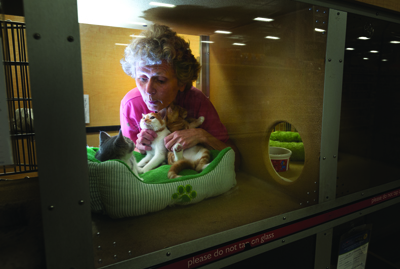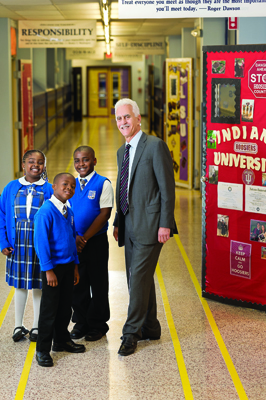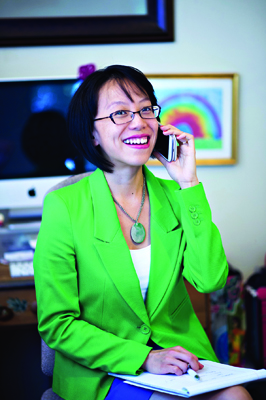Encore Careers
Vocational shifts suit Swarthmoreans, whether they’re traditional retirement age or younger

Former PepsiCo executive Kathy Leser ’76, who now runs an animal rescue, helps place kitties for adoption at PetSmart in Lancaster, Pa. “You get involved in doing something, and it can become a passion, which is what made it a second career,” says Leser. “You learn things you can do to help.” Photo by Laurence Kesterson
The word “retirement” is just about retired—or maybe taking proverbial Botox treatments to stay vibrant. The idea of buying a condo in Florida and warming up the putter five times a week is so 20th century. Baby Boomers keep dreaming of goals and don’t believe the one-career life is sufficient. Maybe Swarthmore grads, with their grounding in the liberal arts, are even more susceptible. And they don’t have to be 60-something to make a radical career change.
When Kathy Leser ’76 took early retirement in 2002, it was just in time to work at the Winter Olympics—at the curling competitions. She’d had a good working life—executive jobs in human relations for companies like the food giant PepsiCo. She traveled the world and was stationed in cool places like Chicago, San Francisco, Dallas, and, finally, the winter sports resort of Salt Lake City.
“That was a wonderful capper, and then it was time to go home,” says Leser, who bought a house on five acres in Lititz, Pa., 10 minutes from where she grew up. “I knew I still wanted to do something, but I was going to give myself time to figure out what.”
It didn’t take long. Leser had long been an animal lover and started volunteering in various rescue services. Last year, she started her own nonprofit, Lost Paws of Lancaster, working mostly to place cats in new homes.
“It is a Swarthmore characteristic,” says Leser. “You see an opportunity to give back, and you step in.”

“I feel like a lucky guy,” says former Jo-Ann Fabrics CEO Alan Rosskamm ’72. Now as CEO of Breakthrough Schools, he says, “I am able to do something meaningful in my hometown, Cleveland. As I retired, I was in the right place at the right time.” Rosskamm checks in on Kaylen Harmon, Allen Barkley, and Kaden Harmon—third-graders at Village Prep, Woodland Hills Campus, in a former Cleveland Metropolitan School District building. Photo by Lonnie Timmons III
“There is a new stage of life emerging between midlife and anything resembling retirement,” says Marc Freedman ’80, the author of The Big Shift: Navigating the New Stage Beyond Middle. (See Page 25 for an excerpt.) “Since the 1950s we’ve been set up for a lifespan of three score and 10, but now it is moving toward five score.
“We’re left with oxymoronic notions like ‘working retired’ or ‘the young old,’ which are really just placeholders for a new chapter in life with distinctive features,” says Freedman. “Sixty is portrayed as both the old 80 and the new 40, but really, 60 is the new 60.”
Randolph Moore ’61 knew two years in advance that he was going to retire from his business career—managing the real estate of family trusts in his native Hawaii. At 60, he started teaching mathematics.
“I had always wanted to teach but got involved in my other career, which, I admit, was good as well,” said Moore.
Hawaii is unusual because the whole state is one school district, with only one superintendent for the wide-ranging islands.
“Hawaii is a big village, and a lot of people know a lot of people. I was a relatively prominent business executive for a long time, and I had met the superintendent of schools well before teaching,” says Moore. Four years into his new career as a middle-school math teacher, she asked him to help manage a school-improvement initiative the legislature had passed. Despite his desire to teach, he said he would help on an interim basis.
“My business background did help—and then ‘interim’ became ‘permanent.’ I did it for more than seven years before finally retiring, as in ‘normal’ retirement, last year,” he says. “It was definitely rewarding, though, to be able to have two distinct careers.”
Alan Rosskamm ’72 agrees. After law school and a few years of practice, he joined the business his grandparents founded, Jo-Ann Fabrics, of which his father was CEO. Eventually, Rosskamm became CEO and turned around the company, which began floundering in the 1980s, by moving it from mall stores to larger big-box-type stores.
All the while, though, Rosskamm had an interest in improving education in his native Cleveland.
“My parents were both immigrants, and their success proves that the American dream works, but if you live in the wrong neighborhood in Cleveland and don’t get a basic education, you don’t stand a chance of that happening,” Rosskamm says. He has since become the CEO of Breakthrough Charter Schools, a nonprofit that has expanded from four to nine kindergarten-through-eighth-grade schools since he started in 2010. Because of his business background, he has worked with the education establishment and the business community to bring what he feels is a quality education to 2,500 students in his hometown.
“I was certainly proud of what I did at Jo-Ann,” he says. “I think Swarthmore prepared me for both. We were good corporate citizens at Jo-Ann, but now I can have a direct impact on the community.”
Sometimes the next career is just off to the side, ready to be grasped. That’s how Ronda Muir ’74 found her career switch. She studied psychology at Swarthmore and Harvard but then went to San Francisco to work in a law firm. Excited about the law, she became an attorney.

“For many years, my first career was awesome, but then I started wondering if I was doing things because it was what was next, but for no other particular reason,” says life coach Gloria Chan ’02, who now works out of her home office in Washington, D.C. “Finally, I got committed to figuring out how to impact the world my way.” Photo by Lisa Helfert
Muir worked in New York, Washington, and abroad, mostly in mergers and acquisitions, but all along the way found that “law firms are known to be highly contentious and poorly managed. Lawyers know a lot, but unlike any other industry, there was no leadership training.”
Deciding to fill that gap, Muir founded Law People Management, which consults with law firms on, as the name implies, people-management issues.
“I like this because lawyers are in fact very smart and educable and, in my mind, this is a bit of a blind spot,” says Muir. “I was always interested in how psychology and law intersected, and so I found the career that was really perfect for me.”
Steve ’73 and Jan Rood-Ojalvo ’73 both ended up changing careers midstream. Jan went to law school early in their marriage, while Steve started happily as a computer programmer. She soon quit to stay at home with what eventually became six children. In the turn-of-the-millennium recession, Steve was laid off and decided to tap into an old passion—teaching. He’s taught middle- or high-school science and math ever since.
In preparation for the college search, their oldest son sought a tutor for his SATs. “Jan looked at what the tutor was doing and said, ‘I can do this,’ ” says Steve. At first, she tutored in their neighborhood using the barter system—her first client gave her haircuts in return. Word of her skill spread and, for the last dozen years, business has been thriving.
Tutoring has had an ancillary benefit, too. Last year, Rachel, the youngest Rood-Ojalvo, became the first student in her high school to have a perfect 2400 score on her SATs.
Long before retirement age, Gloria Chan ’02 also has found a new career niche. She grew up in New York City, the child of struggling Chinese immigrants. Even in high school, and then at Swarthmore and Harvard Law School, Chan made time to advocate for better schooling and to mentor Asian-American young people.
She worked for a congressional representative on Capitol Hill for several years but “reached this dark period where I realized that everything I was thinking of doing was shaped by what I was ‘supposed’ to be doing,” she says. Her overachieving had pushed her past what she really wanted to do—what she had been doing all along “on the side.” For the last several years, Chan has been a life coach—mentoring and advising people about how to achieve career happiness. “Now I am directly in line with what I want to leave behind,” she says.
 Email This Page
Email This Page